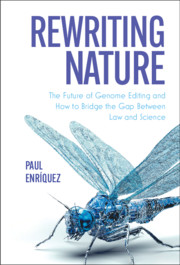Book contents
- Rewriting Nature
- Rewriting Nature
- Copyright page
- Dedication
- Summary of Contents
- Contents
- Figures
- Foreword
- Acknowledgments
- Table of Cases
- Abbreviations
- 1 A Momentous Time for Humankind
- 2 How an Idea Became a Reality
- 3 What Is Genome Editing?
- 4 Molecular Paraphernalia
- 5 What Can Genome Editing Be Used for?
- 6 Redesigning Food
- 7 Regulating Bioengineered Food
- 8 Redesigning Humanity
- 9 DNA and the Administrative State
- 10 Constitutional Predicaments
- 11 Science, Law, and Policy
- 12 Epilogue
- Index
9 - DNA and the Administrative State
Published online by Cambridge University Press: 11 June 2021
- Rewriting Nature
- Rewriting Nature
- Copyright page
- Dedication
- Summary of Contents
- Contents
- Figures
- Foreword
- Acknowledgments
- Table of Cases
- Abbreviations
- 1 A Momentous Time for Humankind
- 2 How an Idea Became a Reality
- 3 What Is Genome Editing?
- 4 Molecular Paraphernalia
- 5 What Can Genome Editing Be Used for?
- 6 Redesigning Food
- 7 Regulating Bioengineered Food
- 8 Redesigning Humanity
- 9 DNA and the Administrative State
- 10 Constitutional Predicaments
- 11 Science, Law, and Policy
- 12 Epilogue
- Index
Summary
Human genome editing has become a reality and is here to stay. A logical question that follows, therefore, is whether the government should regulate the technology and, if so, what precise measures should be adopted to promote or hinder technological development. This chapter focuses on those questions at the intersection of human genome editing—specifically, germline genome editing (GGE) —and administrative law. The chapter highlights the FDA’s role as the agency in charge of protecting the public health by ensuring the safety and efficacy of human drugs and biological products, as well as shepherding scientific discoveries into the clinical realm. By examining precedents in gene therapy and stem-cell interventions, which are likely relevant to GGE, the chapter identifies regulatory gaps and proposes a novel regulatory framework for future GGE interventions. The chapter further frames the regulatory discussion in the context of an existing de facto legislative GGE ban, which prohibits the FDA from reviewing investigational uses of GGE technology in human embryos. Lastly, the chapter argues that the current legislative ban creates more societal costs than benefits, and it increases the likelihood that GGE technologies will be forced to develop in jurisdictions where regulatory systems may be inadequate from social and ethical standpoints.
Keywords
- Type
- Chapter
- Information
- Rewriting NatureThe Future of Genome Editing and How to Bridge the Gap Between Law and Science, pp. 287 - 329Publisher: Cambridge University PressPrint publication year: 2021



